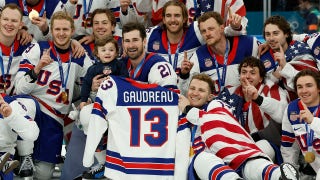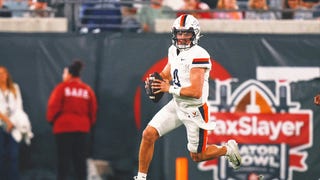If it's any consolation, these two will almost certainly meet again before the season is done.
And maybe the next time, Peyton Manning and Tom Brady will get it right.
You don't expect a showdown between the two greatest quarterbacks of their era to be decided on a fluke play by a special-teams extra — who had no idea where the ball. But it was only fitting that a game chock-full of turnovers should turn one last time on a reel-worthy blooper. Remember that right about the time the drums start beating for Manning-Brady Bowl XV somewhere down the road, maybe all the way up to the AFC championship game.
We love rivalries. But unlike Ali-Frazier or Nicklaus-Palmer or Federer-Nadal, Manning and Brady are never within arm's length of each other on the playing surface, and unless you count the postgame handshakes, never will be. Yet the weeklong buildup to Patriots 34, Broncos 31 was packed with recaps of their past meetings, head-to-head comparisons of passing statistics and even touching anecdotes from teammates, coaches and front-office execs who knew both, especially about how the tough rivals gradually became friends, how each reached out to the other in tough times down through the years.
It was left to the principals themselves to remind the rest of us that's not how football games work, and of course they were right. Both came up big the few times the situation demanded it, and both were prepared to let the outcome ride on their arms. But in bitter cold, with winds gusting steadily around 20 mph, each understood that less is more.
So Manning was only too happy to fashion a 24-0 lead by halftime out of three New England miscues and mostly handing the ball off to running back Knowshon Moreno. And Brady was equally pleased to find out after intermission that the Patriots could grind their way back into the game the same way, then steal it by taking advantage of the last of four Broncos turnovers.
Afterward, Manning faced a slew of questions about why Denver didn't throw more.
"Our game plan is to move the ball and score points. ... The running game was working, so that's what we were going with," he replied.
That was obvious enough. New England came into the game with nose tackle Vince Wilfork and linebacker Jerrod Mayo, their best run-stoppers, out for the season. Not surprising, the final stat sheet showed Moreno collecting 224 yards on his 37 rush attempts, while Manning completed 19 of his 36 passes for only 150 yards.
"But we turned the ball over, gave them two short fields," Manning added, and from the rest of his answers made clear he wasn't in the mood to talk about why the duel everyone expected never materialized.
Brady was more congenial, but no more revealing. He said trailing 24-0, New England's biggest challenge was "to forget what happened in the first half," to "learn from those things and try to get better."
He knew a cold New England night wasn't going to get any warmer, that the wind wasn't going to relent, and if his teammates expected him to make up the deficit by threading the needle in those conditions time and again, they likely were in for a big disappointment. Not that Brady didn't do plenty; he was smart enough not to try and do too much.
"We had some plays in the first half that didn't go our way," he said, "so it was nice to get a good bounce when we needed it."
That came in overtime, when backup Denver cornerback Tony Carter ran into Ryan Allen's punt after it bounced and Nate Ebner recovered at the Broncos 13. New England's Stephen Gostkowski ended it not long after by kicking a 31-yard field goal with just under 2 minutes remaining in the extra period.
Strangely enough, Broncos interim coach Jack Del Rio got the flip side of the questions that dogged Manning. He was asked why Denver didn't run more in the second half.
"We move the ball, we score points," he said, and he's right. Without the turnovers, Denver could have stayed far enough out in front to put the game away. As things turned out, Moreno wore down from all that pounding toward the end, forcing Del Rio to look for other options. The inability of some of those options to hold onto the ball had a much bigger impact, ultimately, then how Manning threw it.
"We came up a little bit short tonight," Del Rio added, "but I'm not going to start to question how we go about our business."
Good thing, too, because as noted earlier, the Broncos and Patriots are clearly two of the three or four best teams in the conference and likely to see each other again. Should that happen, Del Rio might decide to give Manning the green light and let him throw as many times as the game's brainiest quarterback desires.
Del Rio understands there's a time and a place to throw out the playbook and let a great quarterback try to do it by himself. But like Bill Belichick, his New England counterpart, he decided this just wasn't it.
___
Jim Litke is a national sports columnist for The Associated Press. Write to him at jlitke@ap.org and follow him at Twitter.com/JimLitke.








































